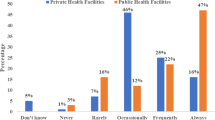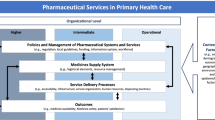Abstract
Objective: Qualitative interviews were conducted with pharmacists in hospitals and clinics in the Rhône-Alpes region of France to determine the role of economic data when selecting medicines for formularies, to identify barriers to the use of this information and to study to what degree a healthcare establishment's financing system influences the use of this data.Method: A stratified sample of healthcare establishments with over 100 short-stay beds were included: (1) thirteen public and semi-private hospitals financed through annual global budgets and (2) six private clinics financed on a fee-for-service basis. Interviews were carried out between October 1999 and January 2000, and coded independently by two researchers.Main outcome measure: A multiple correspondence analysis was performed to compare the two groups of healthcare establishments.Results: The influence of economic data in the decision-making process is limited, for other factors appear to have greater weight: (1) efficacy and safety of medicines (2) relations between decision-makers and the pharmaceutical industry and (3) patient quality of life. Economic data used was mainly related to medication prices and quantities consumed. This data was used in a large number of decisions and seemed to have more importance in hospitals than in clinics. Information related to resources that could be saved by the inclusion of a new medicine on formularies was seldom used and apparently considered less important in hospitals than in clinics. Pharmacoeconomic evaluations were very rarely used. Six barriers to the use of economic data were raised by the pharmacists, including: lack of time, which limits the collection and analysis of such information; insufficient health economics training, an obstacle to decision-makers' analytical capacity; and closed budgets within hospitals.Conclusion: Economic data concerning ‘medication budgets’ appears to have a greater impact in public and semi-private hospitals than in private clinics. Obstacles linked to the decision-making context itself were particularly highlighted, and it can be concluded that in order to increase the use of economic data, it is first necessary to create an environment that is more favourable to its application.
Similar content being viewed by others
References
Elixhauser A, Luce BR, Taylor WR, Reblando J. Health care CBA/CEA: an update on the growth and composition of the literature. Med Care 1993; 31(Suppl 7):J S1–JS11.
Elixhauser A, Halpern M, Schmier J, Luce BR. Health care CBA and CEA from 1991 to 1996: an updated bibliography. Med Care 1998; 36(5): MS1–MS9.
Pritchard C. Trends in economic evaluation. OHE Briefing No. 36. London: Office of Health Economics, 1998.
Drummond MF, O'Brien BJ, Stoddart GL, Torrance GW. Methods for the Economic Evaluation of Health Care Programmes. 2nd ed. Oxford: Oxford University Press, 1997.
Drummond M, Dubois D, Garattini L, Horisberger B, Jönsson B, Kristiansen IS et al. Current trends in the use of pharmacoeconomics and outcomes research in Europe. Value Health 1999; 2(5): 323–32.
Sloan FA, Whetten-Goldstein K, Wilson A. Hospital pharmacy decisions, cost containment, and the use of cost-effectiveness analysis. Soc Sci Med 1997; 45(4): 523–33.
Lafont J, Thiveaud D. La pharmacie hospitalière. Sa gestion, sa pratique. Bordeaux, France: Editions Bergeret, 1995.
Ballereau F, Nicolas F, Rousseau F, Speich M. Enquête sur le concept de comité du médicament. Pharmacie Hospitalière Française 1998; 124: 41–7.
Hansel S. Le rôle dynamique du comité du médicament. J Econ Méd 1992; 10(6): 423–30.
Société Française de Pharmacie Clinique. Référentiel de Pharmacie Hospitalière. Paris: Société Française de Pharmacie Clinique, 1997.
Späth HM, Allenet B, Carrère MO. L'utilisation de l'information économique dans le secteur de la santé: le choix des médicaments à inclure dans les livrets thérapeutiques hospitaliers. J Econ Méd 2000; 18(3–4): 147–61.
Drummond M, Rutten F, Brenna A, Pinto CG, Horisberger B, Jönsson B et al. Economic evaluation of pharmaceuticals. A European perspective. PharmacoEconomics 1993; 4(3): 173–86.
Bonnici B. L'hôpital. Enjeux politiques et réalités économiques. Paris: La Documentation Française, 1998.
Hospital Committee of the European Community. Hospital services in the E.C. Leuven, Belgium: Hospital Committee of the European Community, 1993.
Mathy C. La régulation hospitalière. Paris: Economica, 2000.
Tanti-Hardouin N. L'hospitalisation privée. Crise identitaire et mutation sectorielle. Paris: La Documentation Française, 1996.
Britten N. Qualitative interviews in medical research. In: Mays N, Pope C, editors. Qualitative Research in Health Care. London: BMJ Publishing Group, 1995: 28–35.
Ghiglione R, Matalon B. Les enquêtes sociologiques. Théories et pratique. 6th edition. Paris: Armand Colin, 1998.
Späth HM. L'aide à la décision apportée par l'information économique dans le secteur de la santé: le choix des médicaments à inclure dans les livrets thérapeutiques d'établissements hospitaliers. PhD Thesis, University of Lyon 1, France, 2001 (http://ispb.univ-lyon1.fr/theses/these_integ/spathhans/thesehans. pdf).
Bardin L. L'analyse de contenu. 9th edition. Paris: Presses Universitaires de France, 1998.
Grawitz M. Méthodes des sciences sociales. 9th edition. Paris: Dalloz, 1993.
Ghiglione R, Beauvois JL, Chabrol C, Trognon A. Manuel d'analyse de contenu. Paris: Armand Colin, 1980.
Saporta G. Probabilités, analyse des données et statistique. Paris: Editions Technip, 1990.
Pope C, Mays N. Qualitative methods in health and health services research. In: Mays N, Pope C, editors. Qualitative Research in Health Care. London: BMJ Publishing Group, 1995: 1–9.
Odedina FT, Sullivan J, Nash R, Clemmons CD. Use of pharmacoeconomic data in making hospital formulary decisions. Am J Health Syst Pharm 2002; 59(15): 1441–4.
Chren MM, Landefeld SC. Physicians' behaviour and their interactions with drug companies. A controlled study of physicians who requested additions to a hospital drug formulary. JAMA 1994; 271(9): 684–9.
Wazana A. Physicians and the pharmaceutical industry. Is a gift just a gift? JAMA 2000; 283(3): 373–80.
Crump B, Drummond M, Alexander S, Devaney C. Economic evaluation in the United Kingdom National Health Service. In: Graf von der Schulenburg JM, editor. The Influence of Economic Evaluation Studies on Health Care Decision-Making. Amsterdam: IOS Press, 2000: 97–105.
Zwart-van Rijkom J, Leufkens HGM, Busschbach JJV, Broekmans AW, Rutten FFH. Differences in attitudes, knowledge and use of economic evaluations in decision-making in the Netherlands. PharmacoEcomomics 2000, 18(2): 149–60.
Rorvik EM, Toverund EL, Walloe L. The introduction of pharmacoeconomic analysis in Norway - are the users prepared? Pharm World Sci 2001, 23(4): 135–44.
Duthie T, Trueman P, Chancellor J, Diez L. Research into the use of health economics in decision making in the United Kingdom - Phase II. Is health economics 'for good or evil'? Health Policy 1999, 46: 143–57.
Hoffmann C, Graf von der Schulenburg JM. The use of economic evaluation studies in health care decision-making - summary report. In: Graf von der Schulenburg JM, editor. The Influence of Economic Evaluation Studies on Health Care Decision-Making. Amsterdam: IOS Press, 2000: 3–16.
Späth HM, Carrère MO, Fervers B, Philip T. Analysis of the eligibility of published economic evaluations for transfer to a given health care system. Methodological approach and application to the French Health Care System. Health Policy 1999, 49: 161–77.
Author information
Authors and Affiliations
Rights and permissions
About this article
Cite this article
Späth, HM., Charavel, M., Morelle, M. et al. A qualitative approach to the use of economic data in the selection of medicines for hospital formularies: a French survey. Pharm World Sci 25, 269–275 (2003). https://doi.org/10.1023/B:PHAR.0000006523.22131.69
Issue Date:
DOI: https://doi.org/10.1023/B:PHAR.0000006523.22131.69




